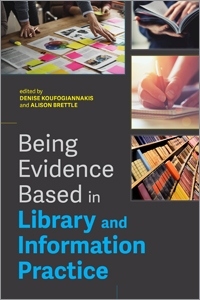
Being Evidence Based in Library and Information Practice
Customers outside of North America (USA and Canada) should contact Facet Publishing for purchasing information.
Primary tabs
You don't need to be an ALA Member to purchase from the ALA Store, but you'll be asked to create an online account/profile during the checkout to proceed. This Web Account is for both Members and non-Members.
If you are Tax-Exempt, please verify that your account is currently set up as exempt before placing your order, as our new fulfillment center will need current documentation. Learn how to verify here.
- Description
- Table of Contents
- About the authors
- Reviews
The book takes an open and encompassing approach to exploring evidence based library and information practice (EBLIP) and the ways it can improve the practice of librarianship. Bringing together recent theory, research, and case studies, it provides librarians with a new reference point for how they can use and create evidence within their practice, in order to better meet the needs of their communities.
Being Evidence Based in Library and Information Practice is divided into two parts; in the first part the editors explore the background to EBLIP and put forward a new model for its application in the workplace which encompasses five elements: Articulate, Assemble, Assess, Agree, Adapt. In the second part, contributors from academic, public, health, school, and special libraries from around the world provide an overview of EBLIP developments and offer examples of successful implementation.
Essential reading for library and information professionals from all types of institutions who want to make more informed decisions and better meet the needs of their users, this book will also be of interest to students of library and information studies and researchers.
Part 1: Background and model
1. Introduction - Denise Koufogiannakis and Alison Brettle
2. A new framework for EBLIP - Denise Koufogiannakis and Alison Brettle
3. Articulate - Alison Brettle and Denise Koufogiannakis
4. Assemble - Denise Koufogiannakis and Alison Brettle
5. Assess - Alison Brettle and Denise Koufogiannakis
6. Agree - Denise Koufogiannakis and Alison Brettle
7. Adapt - Alison Brettle and Denise Koufogiannakis
Part 2: EBLIP in action
8. Practitioner-researchers and EBLIP - Virginia Wilson
9. Academic libraries - Mary M. Somerville and Lorie A. Kloda
10. Public libraries - Pam Ryan and Becky Cole
11. Health libraries - Jonathan D. Eldredge, Joanne Gard Marshall, Alison Brettle, Heather Holmes, Lotta Haglund and Rick Wallace
12. School libraries - Carol Gordon
13. Special libraries - Bill Fisher
14. Conclusion - Denise Koufogiannakis and Alison Brettle
References
Index
Denise Koufogiannakis
Dr. Denise Koufogiannakis is Associate University Librarian at the University of Alberta Libraries in Edmonton, Alberta, Canada. In 2013 she received her PhD in Information Studies from Aberystwyth University, Wales, UK. Denise co-founded the open access journal Evidence Based Library and Information Practice and has held several editorial positions since the journal's inception in 2006, including Editor-in-Chief from 2009-2011. She has contributed numerous research papers to the scholarly literature of EBLIP, and has served on the Program Committee of the international EBLIP conference series since 2003. In 2007, she was named a Library Journal Mover & Shaker for her contributions to the evidence based librarianship movement.
Dr. Alison Brettle
Dr. Alison Brettle is a Reader in Evidence Based Practice at the University of Salford, UK. She has specialist expertise in literature searching, systematic review methodology, evidence based practice and the evaluation of health information services; pioneering the use of systematic reviews in library and information practice. She has over 20 years experience of health, social care and library related research and teaching environments and has led and supported a wide range of projects and published extensively. She has been involved with the open access professional journal Evidence Based Library and Information Practice since its inception, and was Editor-in-Chief 2012-2014. She also hosted and co-chaired the 6th International Evidence Based Library and Information Practice in Salford in 2011. As an active member of the UK professional body, CILIP, she leads research training and awards on behalf of the Library and Information Research Group and has recently authored a systematic scoping review on the value of professionally trained and registered library and information professionals.
”Library administrators and assessment librarians will welcome this focus on practice and application of EBLIP in a variety of settings and places."
— Library Journal
”A sensible and long-term commitment to improving library services of all types through implementation of evidence-based research … This contemporary book will be well received by administrators, practitioners, and students of LIS seeking to find tangible impacts for improved funding and services in libraries."
— ARBA
”The chapters on the kinds and significance of evidence are particularly interesting and show best how the practice has developed over twenty years. Essays by librarians from academic, medical, public, school, and special libraries sketch histories of EBLIP in their disciplines, noting significant areas of research and ongoing challenges that need attention … Recommended for academic libraries supporting graduate study in library and information science."
— Catholic Library World
”Those already familiar with evidence-based practice will appreciate having a real reference to consult, and those new to EBLIP, or to research altogether, will immediately see the value and possibility that EBLIP can offer. The authors succeed in inspiring their readers and empowering them to put their framework to use."
— RUSQ
”The entire book is clearly written, free of jargon (or jargon is explained succinctly), and engaging. Each chapter builds on previous chapters, and the chapters in Part 2 track back appropriately to the explanatory chapters in Part 1. If you are interested in becoming a researcher–practitioner, or in integrating data into your decision-making processes for your library, this book will be quite useful. The book also could be complementary to an introductory textbook on research methods for information professionals looking to grow these skills."
— Journal of Electronic Resources Librarianship


